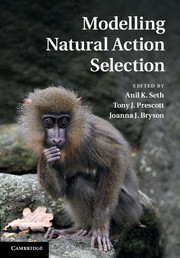Book contents
- Frontmatter
- Contents
- Foreword
- Preface
- Contributors
- 1 General introduction
- Part I Rational and optimal decision making
- 2 Introduction to Part I: rational and optimal decision making
- 3 Do we expect natural selection to produce rational behaviour?
- 4 Optimised agent-based modelling of action selection
- 5 Compromise strategies for action selection
- 6 Extending a biologically inspired model of choice: multi-alternatives, nonlinearity, and value-based multidimensional choice
- 7 Bayesian approaches to modelling action selection
- 8 Post-retrieval inhibition in sequential memory search1
- Part II Computational neuroscience models
- Part III Action selection in social contexts
- Index
- Plate section
- References
7 - Bayesian approaches to modelling action selection
from Part I - Rational and optimal decision making
Published online by Cambridge University Press: 05 November 2011
- Frontmatter
- Contents
- Foreword
- Preface
- Contributors
- 1 General introduction
- Part I Rational and optimal decision making
- 2 Introduction to Part I: rational and optimal decision making
- 3 Do we expect natural selection to produce rational behaviour?
- 4 Optimised agent-based modelling of action selection
- 5 Compromise strategies for action selection
- 6 Extending a biologically inspired model of choice: multi-alternatives, nonlinearity, and value-based multidimensional choice
- 7 Bayesian approaches to modelling action selection
- 8 Post-retrieval inhibition in sequential memory search1
- Part II Computational neuroscience models
- Part III Action selection in social contexts
- Index
- Plate section
- References
Summary
Summary
We live in an uncertain world, and each decision may have many possible outcomes; choosing the best decision is thus complicated. This chapter describes recent research in Bayesian decision theory, which formalises the problem of decision making in the presence of uncertainty and often provides compact models that predict observed behaviour. With its elegant formalisation of the problems faced by the nervous system, it promises to become a major inspiration for studies in neuroscience.
Introduction
Choosing the right action relies on our having the right information. The more information we have, the more capable we become at making intelligent decisions. Ideally, we want to know what the current state of the world is, what possible actions we can take in response to it, and what the outcomes of these actions will be. When we choose actions that will most clearly bring about our desired results, we are said to be behaving rationally (see Chapter 2). Equivalently, we could say that rational behaviour is optimal, in that this behaviour executes the best actions for achieving our desired results (see Chapters 3 and 4). Thus behaving rationally is equivalent to solving an optimality problem: what actions should we select to best achieve our goals?
Information
- Type
- Chapter
- Information
- Modelling Natural Action Selection , pp. 120 - 143Publisher: Cambridge University PressPrint publication year: 2011
References
Accessibility standard: Unknown
Why this information is here
This section outlines the accessibility features of this content - including support for screen readers, full keyboard navigation and high-contrast display options. This may not be relevant for you.Accessibility Information
- 1
- Cited by
